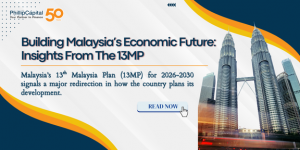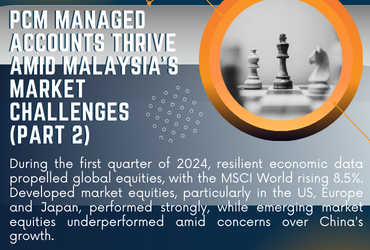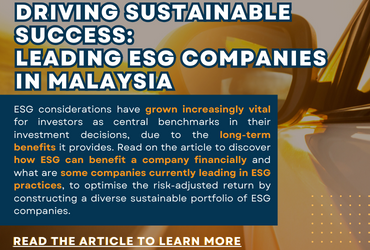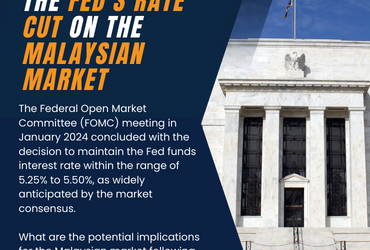
Malaysia’s 13th Malaysia Plan (13MP) for 2026–2030 signals a major redirection in how the country plans its development. Framed around the theme “Melakar Semula Pembangunan” (Redesigning Development), it seeks to elevate Malaysia to a high-income, inclusive and robust economy by 2030. The strategy rests on four pillars: economic complexity, social mobility, public sector reform, and environmental sustainability.
The 13MP projects GDP growth of 4.5%–5.5% annually, with real GNI per capita expected to jump from RM54,793 (2024) to RM77,289 by 2030. Labour productivity is targeted to grow at 3.6% p.a., and the fiscal deficit is expected to fall below 3% of GDP by the end of the Plan period. Headline inflation is forecast at 2%–3%, while public debt is projected to decline from 64.6% to below 60% of GDP by 2030.
Development expenditure (DE) will total RM 430 bn over the five‑year period, up 4% versus the 12MP. Furthermore, additional funding of RM 120 bn from GLCs and GLICs, plus RM 61 bn through public–private partnerships, raises overall investment to RM 611 bn. Of this outlay, roughly 52.8% supports economic initiatives, 30.9% funds social programmes, 11.8% goes to security, and 4% to administration. These investments underpin initiatives that enhance Malaysia’s economic sophistication, with a focus on semiconductors, artificial intelligence and clean energy.
Among the key beneficiaries, the construction sector stands out: annual development spending of around RM 86 bn will fund major infrastructure and flood‑mitigation projects, including the Johor E‑ART system (~RM 7 bn) and Penang LRT (~RM 16 bn), as well as upgrades to the PLUS Expressway, Central Spine Road and Trans‑Borneo highways. Activity is expected to pick up in 2026–27 ahead of the next general election.
Within Renewable Energy sector, the plan raises the renewable‑energy target from 29% to 35% of total capacity by 2030, with a longer‑term goal of 70% by 2050. This expansion is supported by solar, hydrogen and waste‑to‑energy projects, complemented by programmes such as CRESS, CREAM, battery storage and smart grids. Sarawak‑Peninsular grid interconnection, hydrogen hubs, carbon‑capture projects and potential nuclear generation by 2031 will further boost the sector’s prospect, benefiting solar EPC contractors and grid developers.
The semiconductor and AI industries will be promoted through the National Semiconductor Strategy and the New Industrial Master Plan 2030, coupled with a “Made by Malaysia” branding push and stronger digital infrastructure. On the public‑services front, significant investment in healthcare includes upgrading clinics and digitising health records, alongside broader GovTech integration, to improve efficiency and service delivery.
Overall, we expect multi-year tailwinds in thematic plays surrounding infrastructure, digitalisation, and energy transition. In our view, while execution risks remain, particularly around fiscal reform and governance, 13MP sets a credible framework for Malaysia’s structural transformation. The KLCI remains a relative laggard year-to-date, trading at 13.4x P/E—1.1 standard deviation below its 10-year mean—offering attractive valuations. While near-term headwinds persist from rising cost pressures (including SST, electricity tariffs, and EPF contributions for foreign workers), we believe strong domestic liquidity, compelling valuations, and proactive policy support could help mitigate downside risks and support selective buying opportunities ahead.
Phillip Capital Malaysia and our offerings
We reaffirm our belief that there are still opportunities in the market, and we maintain a discerning approach in choosing high-quality stocks for our portfolio. However, it is crucial to exercise caution and carefully select investment options to ensure the best risk-adjusted returns. By taking a vigilant and discerning approach, investors can potentially reap the benefits of the current market opportunities while minimising risks.
A noteworthy avenue for investors seeking diversification in their portfolio is through PhillipCapital Malaysia. PhillipCapital Malaysia offers multiple private mandate services managed by professional fund managers. By leveraging PhillipCapital Malaysia’s private mandate services, investors can enhance their resiliency, optimise portfolio performance, and navigate the complexities of the market with confidence.
We also offer both conventional and Shariah-compliant options to cater to the needs of all investors. For Malaysia’s mandates, we like:
- PMART/PMA Dividend Enhanced and/or PMART/PMA Dividend Enhanced ESG
Our PMART Dividend Enhanced and PMA Dividend Enhanced is an income-driven portfolio focused on high dividend-yielding equities. We apply the Dog of the Dow approach, screen and select top market cap stocks to minimise risk and ensure consistent performance. The portfolio is an equal weighting portfolio which reduces concentration risk and provides similar exposure to all clients, both initially and after rebalancing. We offer both conventional and Shariah investment options to cater to the diverse needs of our investors. Click here to learn more. We recently also introduced PMART/PMA Dividend Enhanced ESG Mandate as we remain dedicated to investing in ESG stocks given their stronger valuation and profitability.
- PMART/PMA ESG
Phillip Capital Malaysia offers discretionary portfolio that invests in stocks with high ESG ratings from the F4GBM and F4GBMS Indices, namely PMART and PMA ESG. There are both conventional and Shariah options available. To explore the companies in which both Conventional and Shariah ESG mandates invest, you can refer to the provided link.
- PMART/PMA Blue Chip and Opportunity
Our Blue-Chip portfolios primarily allocate our investments towards companies with large market capitalisations, while the Opportunity portfolios predominantly invest in companies with smaller market capitalisations. We also offer both conventional and Shariah-compliant options to cater to the needs of all investors.
Please click on the link to learn more or email us at cse.my@phillipcapital.com.my if you require any further information.
Disclaimer
The information contained herein does not constitute an offer, invitation, or solicitation to invest in any product or service offered by Phillip Capital Management Sdn Bhd (“PCM”). No part of this document may be reproduced or circulated without prior written consent from PCM. This is not a unit trust or collective investment scheme and is not an obligation of, deposit in, or guaranteed by PCM. All investments carry risks, including the potential loss of principal.
Performance figures presented may reflect model portfolios and may differ from actual client accounts’ performance. Variations in individual clients’ portfolios against model portfolios and between one client’s portfolio to another can arise due to multiple factors, including (but not limited to) higher relative brokerage costs for smaller portfolios, timing of capital injections or withdrawals, timing of purchases and sales, and mandate change (e.g., Shariah vs. conventional). These differences may impact overall performance.
Past performance is not necessarily indicative of future returns. The value of investments may rise or fall, and returns are not guaranteed. PCM has not considered your investment objectives, financial situation, or particular needs. You are advised to consult a licensed financial adviser before making any investment decisions.
While all reasonable care has been taken to ensure the accuracy and completeness of the information contained herein, no representation or warranty is made, and no liability is accepted for any loss arising directly or indirectly from reliance on this material. This publication has not been reviewed by the Securities Commission Malaysia.






